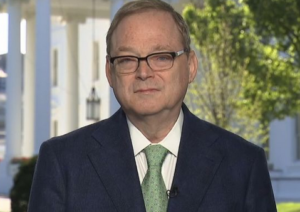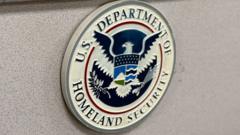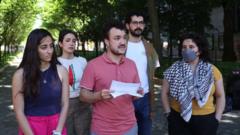Kilmar Abrego Garcia, who was wrongly deported from Maryland to El Salvador, is reported to be "alive and secure" by US officials following a Supreme Court ruling demanding his return. Although his deportation stemmed from an "administrative error", the complexity of his case highlights ongoing tensions in US immigration policy under the Trump administration and raises questions about judicial intervention.
US Man Mistakenly Deported to El Salvador Found Safe, Legal Challenges Ahead

US Man Mistakenly Deported to El Salvador Found Safe, Legal Challenges Ahead
A man mistakenly deported to El Salvador has been confirmed safe by US officials, sparking discussions around immigration enforcement and judicial authority.
Kilmar Abrego Garcia, a man deported from Maryland to El Salvador by the Trump administration, has been confirmed "alive and secure" at a detention facility by US State Department officials. This update follows a recent Supreme Court ruling mandating the US government to facilitate his return to the United States after it was revealed that his removal was due to an "administrative error."
Michael Kozak, a State Department official, stated Garcia is currently housed in the Terrorism Confinement Center in El Salvador, amidst ongoing legal battles regarding his immigration status. Garcia, a Salvadoran national, entered the US illegally as a teenager and received protections against deportation in 2019. His deportation was part of a broader strategy by the Trump administration to return migrants alleged to be gang members to El Salvador, where conditions may endanger their safety.
The situation has drawn heightened scrutiny, as Garcia’s attorneys argue that the government is leveraging delaying tactics to obscure its responsibilities. Despite the Supreme Court's unanimous decision backing Judge Paula Xinis's earlier order for his return, the government has shown reluctance to comply, prompting the judge to demand daily updates on the matter.
Turning political, President Donald Trump, who is scheduled to meet with El Salvador’s President Nayib Bukele, reiterated his intent to follow the Supreme Court's directive while expressing his administration's commitment to deporting 'violent offenders' back to El Salvador. His rhetoric has raised concerns about the labeling of deported individuals, which he referred to as "barbarians".
As national discussions on immigration continue to evolve, Garcia's case exemplifies the contentious interplay between judicial authority, executive action, and the often perilous realities faced by individuals in the immigration system.






















